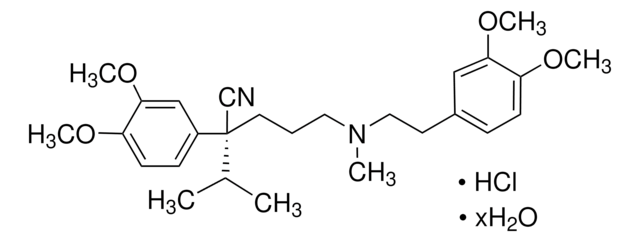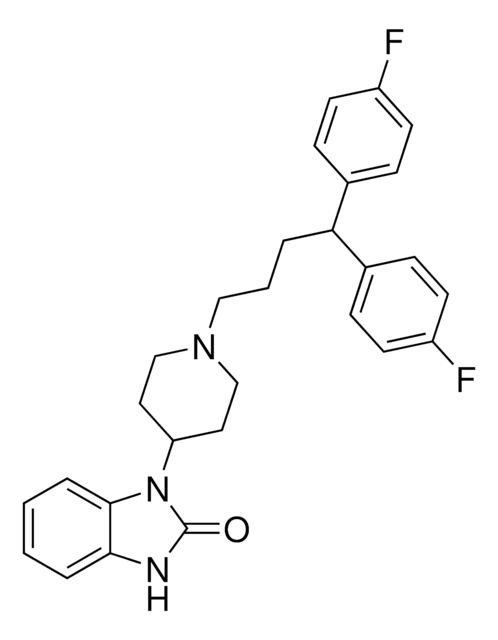V105
S(−)-Verapamil hydrochloride hydrate
≥98% (HPLC), powder
About This Item
Recommended Products
Quality Level
Assay
≥98% (HPLC)
form
powder
optical activity
[α]22/D −6.1°, c = 0.1 in ethanol(lit.)
storage condition
desiccated
protect from light
color
white to beige
solubility
H2O: >30 mg/mL
ethanol: soluble
SMILES string
O.Cl.COc1ccc(CCN(C)CCC[C@](C#N)(C(C)C)c2ccc(OC)c(OC)c2)cc1OC
InChI
1S/C27H38N2O4.ClH.H2O/c1-20(2)27(19-28,22-10-12-24(31-5)26(18-22)33-7)14-8-15-29(3)16-13-21-9-11-23(30-4)25(17-21)32-6;;/h9-12,17-18,20H,8,13-16H2,1-7H3;1H;1H2/t27-;;/m0../s1
InChI key
ICKXRKHJKXMFLR-LPCSYZHESA-N
Biochem/physiol Actions
Features and Benefits
Signal Word
Danger
Hazard Statements
Precautionary Statements
Hazard Classifications
Acute Tox. 3 Oral
Storage Class Code
6.1C - Combustible acute toxic Cat.3 / toxic compounds or compounds which causing chronic effects
WGK
WGK 3
Flash Point(F)
Not applicable
Flash Point(C)
Not applicable
Personal Protective Equipment
Certificates of Analysis (COA)
Search for Certificates of Analysis (COA) by entering the products Lot/Batch Number. Lot and Batch Numbers can be found on a product’s label following the words ‘Lot’ or ‘Batch’.
Already Own This Product?
Find documentation for the products that you have recently purchased in the Document Library.
Customers Also Viewed
Articles
Discover Bioactive Small Molecules for ADME/Tox
Discover Bioactive Small Molecules for ADME/Tox
Discover Bioactive Small Molecules for ADME/Tox
Discover Bioactive Small Molecules for ADME/Tox
Our team of scientists has experience in all areas of research including Life Science, Material Science, Chemical Synthesis, Chromatography, Analytical and many others.
Contact Technical Service













